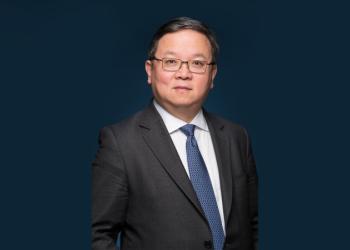News & Stories
2024
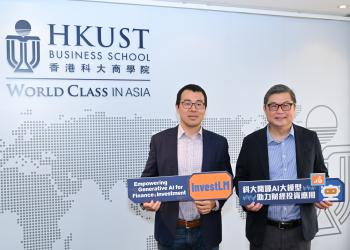
News
HKUST’s InvestLM Generative AI Platform Launches to Support Financial SMEs Harnessing the Potential of AI Technology
Following the successful development of InvestLM — Hong Kong's first open-source large language model (LLM) for financial generative AI (GenAI) applications, the School of Business and Management of the Hong Kong University of Science and Technology (HKUST Business School) has just launched the InvestLM Generative AI Platform, which will be opened for free registration to the financial services industry in phases. The platform is capable of handling finance-related GenAI tasks and generating human-like responses comparable to those of well-known general-purpose chatbots.
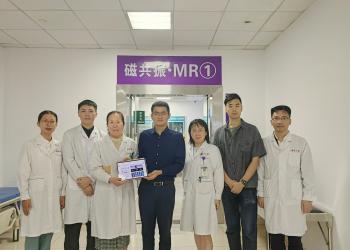
News
Diagnosing Knee Abnormalities Like an Experienced Radiologist: A Novel Deep Learning Model by HKUST Engineering School
Multi-sequence knee magnetic resonance imaging (MRI) is an advanced non-invasive diagnostic method for knee pathology. However, MRI interpretation is highly time-consuming and heavily dependent on expertise. A research team from the School of Engineering, the Hong Kong University of Science and Technology (HKUST) has introduced a novel deep learning model which can assist with classifying 12 common types of knee abnormalities, enhancing both efficiency and accuracy.
The study was a collaboration between the Smart Lab of HKUST in Hong Kong and the Third Affiliated Hospital of Southern Medical University in Guangzhou, China. Their innovation was recently published in Nature Communications, in a paper titled “Learning Co-Plane Attention Across MRI Sequences for Diagnosing Twelve Types of Knee Abnormalities”.
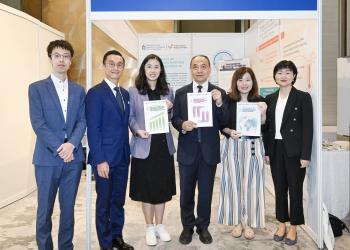
News
HKUST and HKUST(GZ) Major Cross-campus Joint Study Calls for Strategic Update to Boost Hong Kong’s Green Finance Transition
Signifying the major research collaboration across the two HKUST campuses in Clearwater Bay and Guangzhou, a joint research report series by The Hong Kong University of Science and Technology (HKUST) and The Hong Kong University of Science and Technology (Guangzhou) (HKUST(GZ)) analyzes Hong Kong’s progress and outlines steps to enhance its role as a green finance leader. The research team, composed of experts from both campuses, underscores the necessity for Hong Kong to refine its strategies. By doing so, the city could bolster its competitiveness in the international green finance landscape, thereby positioning itself as a preeminent center for green and sustainable bonds.
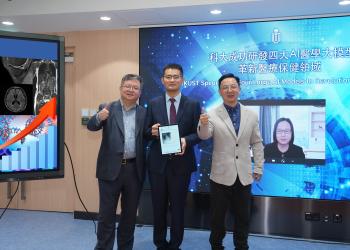
News
HKUST Spearheads Four Large AI Models to Revolutionize Healthcare
In a groundbreaking initiative, The Hong Kong University of Science and Technology (HKUST) has unveiled four AI-driven models poised to transform the medical and healthcare fields. These AI models can assist both general and specialist medical practitioners in diagnosing and prognosing up to 30 types of cancers and diseases, with some achieving accuracy comparable to that of medical experts with five years of experience or more.
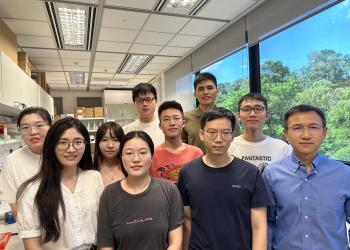
News
HKUST's Novel Gene Discovery Paves the Way for Treating Central Nervous System Injuries
A collaborative study in neuroscience, spearheaded by a research team of the Hong Kong University of Science and Technology (HKUST), sheds light on new possibilities for treating central nervous system (CNS) injuries, as published in PNAS*. Through the discovery of a novel gene that regulates the regeneration of multiple types of CNS axons, researchers have achieved a significant stride towards repairing damaged neural networks.
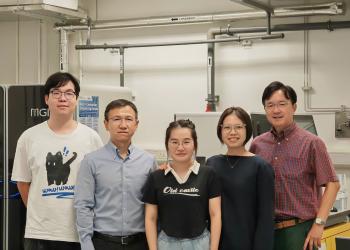
News
HKUST Researchers Reveal Microglia’s Crucial Role in Preventing Axonal Degeneration Following Spinal Cord Injury
A collaborative effort between engineers and biologists at the Hong Kong University of Science and Technology (HKUST) has uncovered a neuroprotective mechanism in spinal cord injury (SCI), shedding new light on therapeutic approaches to potentially benefit millions of patients worldwide.
While SCI is a devastating condition with profound, life-altering consequences, unfortunately, a definitive cure remains elusive. For a long time, the study of axon damage and regeneration in SCI has been constrained by the lack of suitable in vivo imaging tools capable of visualizing undisturbed cellular processes within the spinal cord.
News
HKUST Introduces City’s Largest Liquid Immersion Cooling Technology for Sustainable AI & Scientific Research
To meet the surging demand for high-power AI research sustainably, The Hong Kong University of Science and Technology (HKUST) has launched the city’s largest Liquid Immersion Cooling system in its new research computing facility. This new technology reduces energy consumption for cooling by over 80% and creates an optimal operating environment that can enhance computing performance at lower temperature.
High Performance Computing (HPC) is vital for scientific research that involves analyzing vast amounts of data or complex algorithms. However, they consume significant electricity, and excessive heat can hinder their performance.









